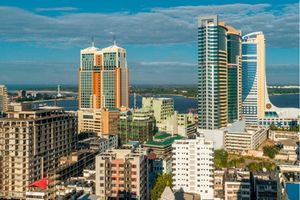Mpango warns over blockage of Ruaha River

What you need to know:
- Vice president Philiph Mpango yesterday pledged action over activities that have resulted in restricted flow of water to the Great Ruaha River, which is key in hydropower generation and wildlife sustenance
Iringa. Vice President Philip Mpango yesterday warned people said to be behind the pollution in the Ihefu Valley.
The pollution has resulted in blockage of water to the Great Ruaha River, which is key for hydropower generation and wildlife sustenance.
Dr Mpango’s warning came after Tanzania Editors Forum (TEF) chairman Deodatus Balile said while addressing a forum of editors, journalists and other stakeholders in Iringa Region that there were 12 families that own a ranch, which restricted the flow of water to the Great Ruaha River, leading to environmental degradation.
“The ranch is owned by people in the government and other powerful individuals. Honourable Vice President, people close to you might be afraid to speak up, but I’m not. I’m ready to give you a list of those who own the ranch that’s destroying the environment,” said Mr Balile before handing over the list to Dr Mpango.
The list, which this paper has seen but cannot independently verify, contains the names of influential politicians and top businesses in the country.
Following the revelation by TEF, Dr Mpango said the government would take legal action against climate and environment “criminals”, regardless of their status.
“It’s a big fight, but we’ll win, regardless of whether they’re politicians, poachers, or illegal fishermen.”
According to TEF, an order to vacate the ranch in question was issued under Government Notice No. 28, “but surprisingly, it is still operating, and we are now witnessing the consequences,” said Mr Balile.
He added that when Tanzania experienced prolonged dry spells in 1995 and a dire need for more power generation, IPTL came into being.
“We all know what happened with IPTL,” Mr Balile remarked.
“Again, in 2006, another prolonged dry spell led to the Richmond and Dowans scandals. We all know what happened then as well.”
Dr Mpango stressed that the government was ready to receive suggestions and cooperate with stakeholders to bring to justice those destroying the environment.
“We will talk to anyone who is allegedly using their position in court because anything that goes against these pillars of the law is not acceptable,” he said.
The VP also directed the managers of the Rufiji River Valley and Wami-Ruvu Basin to verify permits and take action against those who do not have permits to set up barriers along river basins.
He further said that in Tanzania, the level of land destruction increased from 42 percent in 1980 to 50 percent in 2012, and until 2018, the country had misused 63 percent of its land.
“This is mostly attributed to human activities such as cutting trees, burning forests, invasion of preserved forests and water sources, illegal fishing, and poor waste management.
“As a result, we have witnessed the consequences of climate change, such as drought and unpredictable rainfall,” Dr Mpango said.
Centre for Information and Resources Advocacy (Mecira) chairman Habibu Mchange said it had been 130 days since water last flowed to the Great Ruaha River.
“As journalists, we will not leave the responsibility of the environment to only the government,” he said.
Tanzania Forest Services (TFS) chief executive Dos Santos Silayo said the agency had prepared various strategies to preserve the forests, including continuous awareness campaigns and education of the community on the importance of environmental conservation.
Iringa Regional Commissioner Halima Dendego suggested that the army camp at all water sources and remove families living there illegally as human activities contribute to the destruction of water sources.






